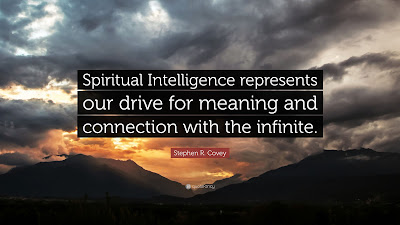Spiritual Intelligence: The divine wisdom to grow
We are living in the most technologically advanced age. In this emerging era of information technology, artificial intelligence has changed the face of our lives. We fly in the sky, we swim under the water, and we run fast upon the earth. What's not possible with the help of science and technology?
But one thing we also need to consider is that the modern age has given birth to conflict with competition, stress with turmoils, and fear with uncertainty. Everyone is ambitious to be successful. In this race of success, we might be a victim of failures and setbacks. Unease and distress may agitate us. We may be stuck in our minds. So here is a kind of intelligence that can help us.
In earlier times, only IQ was considered to be successful. But with time, experts realized that with IQ, man must nurture EQ to be successful. Now the new insights revealed that man must cultivate SQ as the core quality in life. Whatever happens in life, worst or best, if we have divine wisdom as an undercurrent, we can handle it well.
IQ can make a man a good worker, EQ can make a man a good leader, but SQ can make a man a legend. So it’s in our hands to develop these qualities with understanding and effort. Let’s explore and learn them.
(1) Self-awareness:
Knowing what I believe in and value, and what deeply motivates me.
It is about the purpose of life. For what I am living and what I would die for. What is the ultimate motivation for human life? Deeper and more truthful communication with self, lets us take better actions in the outer world. It’s about aligning, what I think and what I do. Ultimately where I am leading my life.
(2) Spontaneity:
Living in and being responsive to the moment.
It’s not about acting out of an impulse or reaction. Emotional bumps may cause inadequate behavior patterns. It’s about acting out of the practice of self-control and self-discipline. We rise above childhood problems, prejudices, assumptions, values, and projections. We accept responsibility, let go of old baggage, and act out of prudence.
(3) Being vision and value-led:
Acting from profound principles and deep beliefs, and living accordingly.
Mostly we are driven by the vision and values gained in our education system or professional culture. What kind of principles and beliefs do I have? Are they holy and legit? Being led by religious principles and truthful beliefs is the essence of it. It gives a different meaning while we act and live.
(4) Holism:
Seeing larger patterns, relationships, connections; and having a sense of belonging.
Everything is interconnected and interdependent. We need to understand and accept it. What I think, feel and value affects the whole world. When I realize, I am part and parcel of the system, it encourages cooperation. So holism nurtures collaboration and oneness instead of competition and separateness.
(5) Compassion:
Having a quality of “feeling-with” and deep empathy.
I don’t just recognize or accept one’s feelings, I feel them. I can feel the pain and frustration behind the behavior. So I can treat myself and others in a better and more positive way. And if I have to fight with it, I can do it with compassion, understanding, and knowledge.
(6) Celebration of diversity:
Valuing other people for their differences, not despite them.
Compassion is strongly linked to diversity. When someone disagrees, it makes us grow. When someone challenges our assumptions and questions our values, it forces us to rethink and rebuild. We rewire our minds and something new emerges. We should appreciate rattling the cage. Instead of being in pain, celebrate the differences.
(7) Field Independence:
Standing against the crowd and having intellectual conviction.
It’s about standing alone when no one believes in it. It’s about walking alone when others quit. It comes out of our own intellectual conviction. When we carefully consider everything and come to the rightful conclusion, we follow it, even after no one else stays with us. We are not worried about unpopularity and judgments.
(8) Humility:
Having a sense of being a player in a larger drama, of one’s true place in the world.
Humility is necessary on another side of field independence. Whereby I realize that I am one actor in a larger play and that I might be wrong. So I question myself ruthlessly. Am I right for what I do? Have I listened to all the arguments against it? Have I considered all the required factors? Humility makes us great, not small. It makes us proud to be a voice in the choir.
(9) The tendency to ask fundamental “Why” questions:
Understanding things and getting to the bottom of them.
“Why?” is subversive, and we are often frightened by questions without easy answers. Why are we doing it this way rather than that way? Why am I doing this, and what does it exist for? Why aren’t we doing something else? Answers are a finite game; they’re played within boundaries, rules, and expectations. Questions are an infinite game; they play with the boundaries, and they define them.
(10) Flexibility:
An ability to adopt change and be in harmony with it.
Change is the nature of life. Real intelligence resides in how we bring change in self and circumstance. And do we feel congruent with it? Those who don't change, decay. Those who change with the change, and grow. Those who change before the change comes, create.
(11) Ability to reframe:
Standing back from a situation or problem and seeing the bigger picture.
Reframing refers to the ability to stand back from a situation and look for the bigger picture. One of the greatest problems in our world today is short-term thinking. In caring for short-term returns, we may lose long-term growth. It’s everywhere in our education system and business models. We must get back and have a wider context of the situation. So we can reframe and rewire things.
(12) Positive use of an adversity:
Learning and growing from mistakes, setbacks, and sufferings.
It’s about recognizing and acknowledging mistakes. We may be trapped in the courses of action because the initial step was wrong. It might be done actively or passively, we must cultivate the courage to admit it. When we own the responsibility, we can improve it. Inevitable suffering gives painful experiences. I can learn how to transcend pain into pleasure and use it for growth. It makes me wiser, stronger, and braver.
(13) Balance of mind:
An ability to be steady in everything
It’s about balancing our thoughts while we act. Once the thoughts are in harmony, our behavior will be stabilized. Most of the chaos starts with interpretation. Interpretation gives shape to behavior. People may be coercive, and situations may be negative, but if we can streamline our thoughts, we can behave in a meaningful way.
(14) Attached detachment:
Being fully in the present moment, and detached from anything else.
We bring work at home, and home at work. It becomes difficult when we get high emotional fluctuations. Mindfulness helps to control and divert emotions. Being fully in where we are, comes out of practice. We can try to alter emotions whenever they get diluted.
(15) Sense of vocation:
Feeling called upon to serve, to give something back.
It’s about a sense of gratitude. When I gain something, it’s not possible without the help of others. God has given inspiration within. Society has played a role in my achievement. So It’s my noble duty to give back. I need to give back out of a thankful heart.
How to bring change:
This is the most important part of the execution. Human behavior is very complex. It requires due diligence to bring it to life. In Indian culture, driving emotions are defined as the Kama, Krodha, Lobha, Moha, Mada, and Matsara.
We must understand these qualities and our driving thought patterns to bring change. We must transcend our motivation. Most of the problems on earth are created due to the lack of effort to bring change in life. The information must be turned into knowledge, and knowledge into wisdom.
Introspection can help us. Being in communication with ourselves can help us. Once we understand our qualities and ourselves, we can map the gap and put effort into it. Trying to practice out of wisdom in a proper contextual manner will definitely work.
I would like to conclude that the most important aspect of Spiritual Intelligence is absolute faith in God. Real spirituality lies in connection with God. In-communion with God works a lot to cultivate SQ. Feeling the nearness of God, and feeling blessed by him in every situation, surely helps to develop a Spiritual Quotient.
Note: I have written this article by taking inspiration from Swami Gyanvatsal. He has given a very good understanding of it with reference to the book: “Spiritual Intelligence: The Ultimate Intelligence'' written by Ian Marshall and Dana Zohar. Only I have edited it in a way that touches my heart. In the spiritually dumb culture, it awakens. I pray to God, to bless us with high SQ. Stay enlightened and feel blessed.




Comments